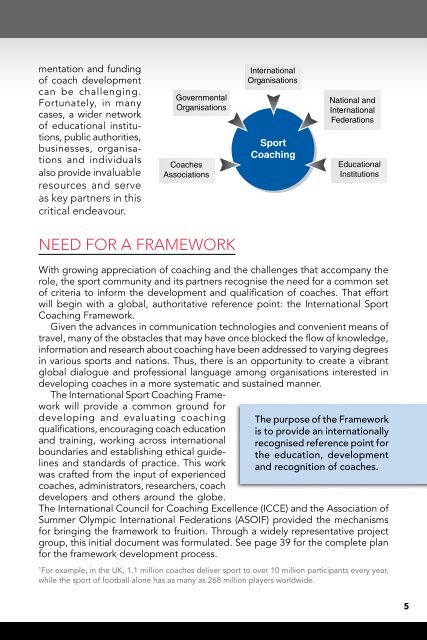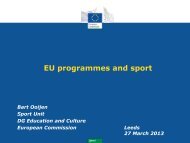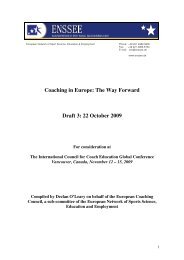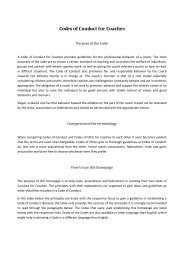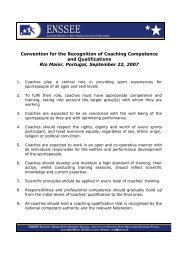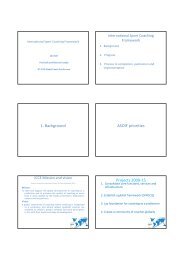International Sport Coaching Framework â version 1.1
International Sport Coaching Framework â version 1.1
International Sport Coaching Framework â version 1.1
Create successful ePaper yourself
Turn your PDF publications into a flip-book with our unique Google optimized e-Paper software.
mentation and funding<br />
of coach development<br />
can be challenging.<br />
Fortunately, in many<br />
cases, a wider network<br />
of educational institutions,<br />
public authorities,<br />
businesses, organisations<br />
and individuals<br />
also provide invaluable<br />
resources and serve<br />
as key partners in this<br />
critical endeavour.<br />
Governmental<br />
Organisations<br />
Coaches<br />
Associations<br />
<strong>International</strong><br />
Organisations<br />
<strong>Sport</strong><br />
<strong>Coaching</strong><br />
Figure 0.1<br />
National and<br />
<strong>International</strong><br />
Federations<br />
Educational<br />
Institutions<br />
NEED FOR A FRAMEWORK<br />
With growing appreciation of coaching and the challenges that accompany the<br />
role, the sport community and its partners recognise the need for a common set<br />
of criteria to inform the development and qualification of coaches. That effort<br />
will begin with a global, authoritative reference point: the <strong>International</strong> <strong>Sport</strong><br />
<strong>Coaching</strong> <strong>Framework</strong>.<br />
Given the advances in communication technologies and convenient means of<br />
travel, many of the obstacles that may have once blocked the flow of knowledge,<br />
information and research about coaching have been addressed to varying degrees<br />
in various sports and nations. Thus, there is an opportunity to create a vibrant<br />
global dialogue and professional language among organisations interested in<br />
developing coaches in a more systematic and sustained manner.<br />
The <strong>International</strong> <strong>Sport</strong> <strong>Coaching</strong> <strong>Framework</strong><br />
will provide a common ground for<br />
developing and evaluating coaching<br />
qualifications, encouraging coach education<br />
and training, working across international<br />
boundaries and establishing ethical guidelines<br />
and standards of practice. This work<br />
was crafted from the input of experienced<br />
coaches, administrators, researchers, coach<br />
developers and others around the globe.<br />
The purpose of the <strong>Framework</strong><br />
is to provide an internationally<br />
recognised reference point for<br />
the education, development<br />
and recognition of coaches.<br />
The <strong>International</strong> Council for <strong>Coaching</strong> Excellence (ICCE) and the Association of<br />
Summer Olympic <strong>International</strong> Federations (ASOIF) provided the mechanisms<br />
for bringing the framework to fruition. Through a widely representative project<br />
group, this initial document was formulated. See page 39 for the complete plan<br />
for the framework development process.<br />
1<br />
For example, in the UK, <strong>1.1</strong> million coaches deliver sport to over 10 million participants every year,<br />
while the sport of football alone has as many as 268 million players worldwide.<br />
5


